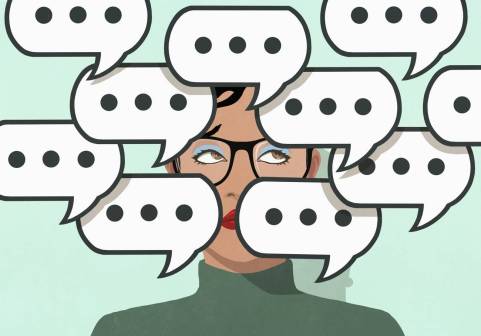Chatbot snapshot: How state, local government websites use AI assistants
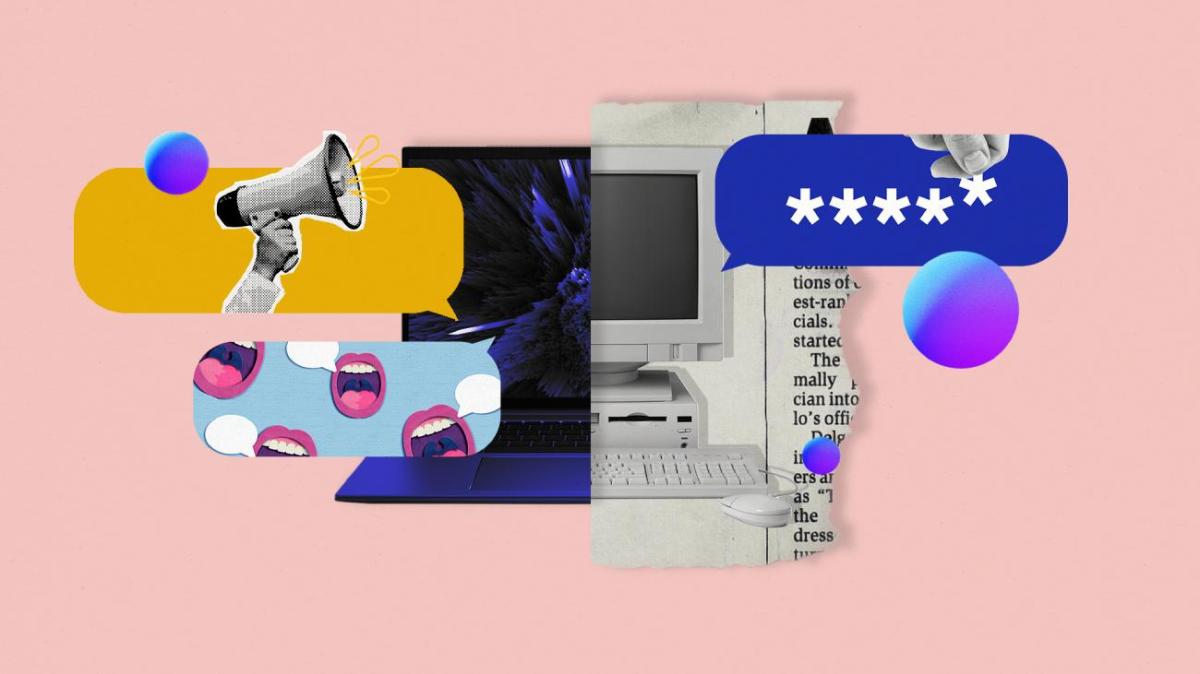
Over the last several years, artificial intelligence-powered chatbots that can help residents with tasks such as voter registration or filing for unemployment have become a staple of state and city government websites.
According to a 2020 tally from a report issued by the National Association of State Chief Information Officers, nearly 75% of states deployed chatbots to assist government employees with providing services related to the COVID-19 pandemic. Several chatbots were specialized to address needs created by the pandemic, but several state technology chiefs had been exploring the technology prior to March 2020, in anticipation of the right business case.
Kirsten Wyatt, senior director of the Digital Service Network at the Beeck Center for Social Impact and Innovation and Georgetown University, said the pandemic was instrumental in making chatbots more commonplace.
“I think that [the pandemic] prompted the need to be able to really swiftly and consistently give information to people about government services, and then, as we’ve seen, a rise in interest in citizen or customer experience,” she said. “Chatbots really have become a cornerstone of making sure that somebody, when they’re accessing government services, can understand or be able to ask a question in their own way to get to what they need.”
Despite their growing importance, not all chatbots are built equally. Some, such as those used by Texas and Georgia, are highly automated, to provide answers to specific questions. Others, like New York City’s, use generative AI to provide answers to citizens, even if it does so incorrectly at times.
But the most important thing, Wyatt said, is for governments to understand what problems their chatbots are solving.
“A lot of it just depends on a government knowing what their [chatbot’s] intended use is for, and really having that value proposition or that reason for investing in it defined up front,” she said. “And so people don’t get too far over their skis about what it’s going to accomplish because if your sense is this is going to solve your customer service needs, it’s probably a huge overreach given that not everyone is going to use the chatbot, and you’re going to have to evolve your citizens or your constituents into using it.”
Texas
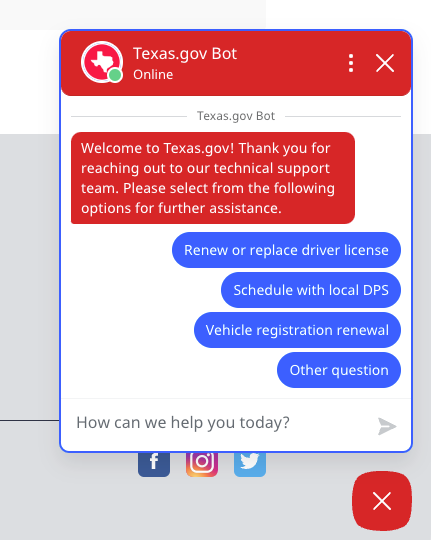
The chatbot found in the right corner of Texas.gov, developed by Capgemini, launched just six weeks ago. It’s designed to offer answers from the website’s frequently asked questions page, according to Brittney Paylor, director of media and government relations at the Texas Department of Information Resources. It can help users create appointments to renew driver’s licenses in-person or update their vehicle registrations.
When asked questions not found in the website’s FAQs, the bot switches over to a live human agent. When StateScoop asked the bot how to apply for women, infants and children benefits, a live agent took over to direct us to information on the state’s 211 website. Paylor said the chatbot has so far proven to be a successful self-service option. She said the state technology department plans to continue training the bot on new content.
Georgia Department of Labor
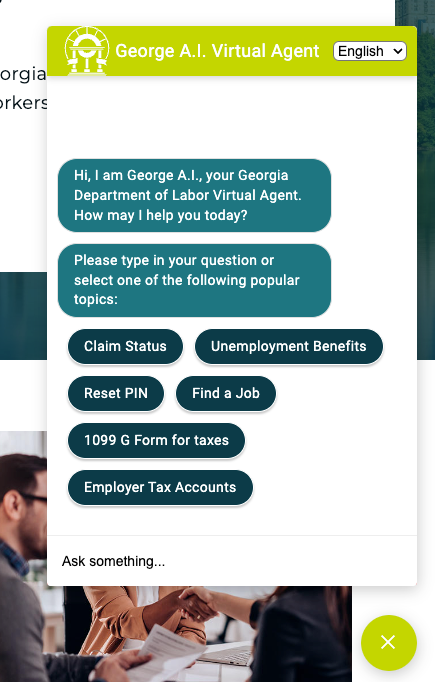
The Georgia Department of Labor website’s chatbot — George A.I. — can help with unemployment insurance benefits, job searches and finding tax forms. Matt Foley, the department’s chief information officer, said the bot “significantly enhanced and modernized public service delivery.”
Foley said that since its launch in early 2022, more than 2.5 million users have interacted with George, and it has accurately addressed queries 97% of the time. The chatbot, which is powered by Cisco, has also garnered the department awards, such as WebEx’s “bold explorer award” last year.
Foley said Georgia Labor Commissioner Bruce Thompson has committed to making AI part of his broader initiative to modernize the agency and drive operational efficiency.
New York City
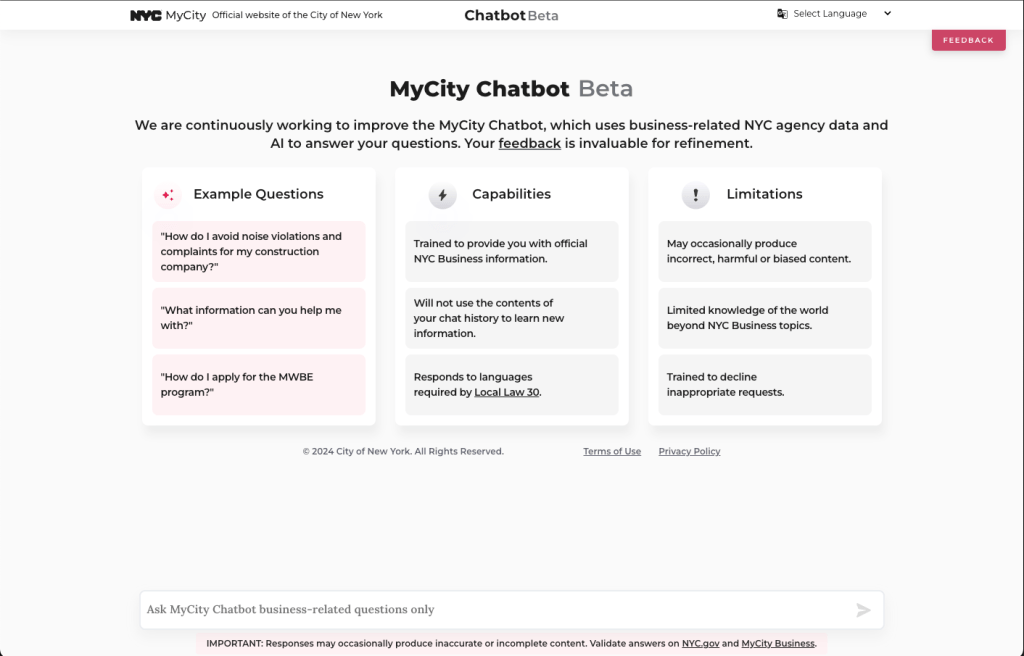
New York City’s MyCity Chatbot — one of the few public-facing bots powered by generative AI — launched in October 2023 to provide answers about information found on MyCity Business and NYC.gov. Journalists and special interest groups soon criticized the bot for providing incorrect answers to questions on topics including housing rights to worker protections. Users are warned prior to use that the bot may occasionally provide incomplete or inaccurate responses.
Mayor Eric Adams has defended the chatbot, arguing that technology can not be adequately tested “in a lab.”
“Only those who are fearful sit down and say, ‘Oh, it’s not working the way we want. Now we have to run away from it altogether.’ I don’t live that way,” Adams said in April after the chatbot’s accuracy was called into question. “Every evolution is going to build a better product until the product becomes an excellent, perfect product. And it’s never perfect.”
The New York City Office of Technology and Innovation declined to comment.
Mississippi
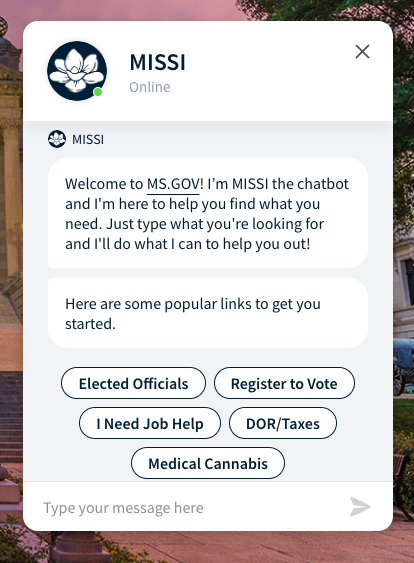
Similarly styled to the chatbots used by Texas and Georgia’s Department of Labor, Mississippi’s chatbot — fondly called Missi — is also preprogrammed with a handful of question topics. For help with taxes, users are directed to the Department of Revenue’s Online Services website. Users can also seek out information about elected officials, voter registration and applying for medical cannabis cards.
Stephanie Hedgepeth, chief administrative officer of the Mississippi Department of Information Technology Services, said the chatbot is part of a self-funded program through Tyler Technologies that also includes the state’s official website and other online services for Mississippi residents and businesses. Hedgepeth said state tech leaders are “very pleased” with the effectiveness of the chatbot and its awards.
Illinois
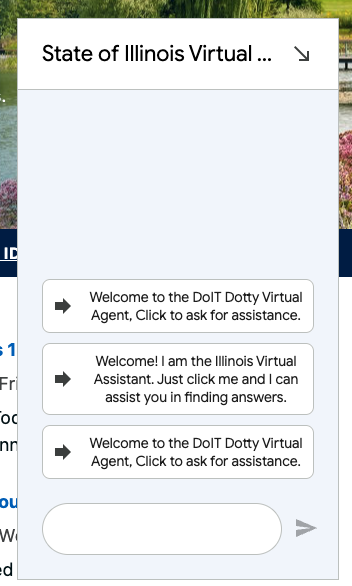
The State of Illinois website’s chatbot, Dotty, doesn’t offer preprogrammed topics, but it responds to simple questions about government services. When asked how to renew a driver’s license, it responds with a fact about the Illinois Driver Services Department, such as how many licensed drivers there are in the state and how many motor vehicle departments there are, along with a link to renew driver’s licenses online.
Massachusetts
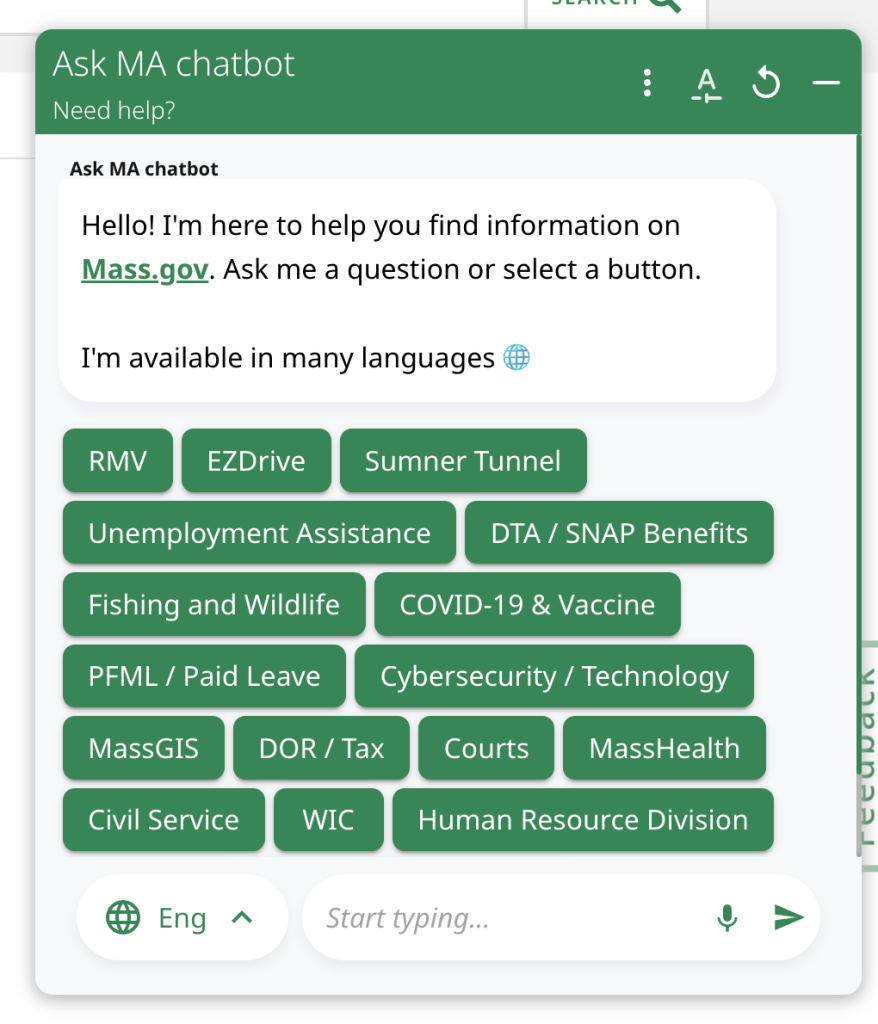
The Ask MA Chatbot, which can be found in the bottom right corner of the state’s website after clicking through a landing page, launched in August 2022. The chatbot, which was developed by NeuroSoph, features several preprogrammed topics, is multilingual and also offers users the option of manually typing queries.
Selena Taliento, the communications and change manager for the Commonwealth Digital Roadmap within the state’s Executive Office of Technology Services and Security, said the Ask MA Chatbot serves nearly 1.2 million active monthly users who ask questions about 22 government services, answering on average 3.46 million visitor messages per month.
She said the goals of the Mass Digital Team, which leads the efforts behind the chatbot, are to reduce the time people spend searching for information, eliminate clicks across web pages and alleviate the burden on customer service centers.
Kansas
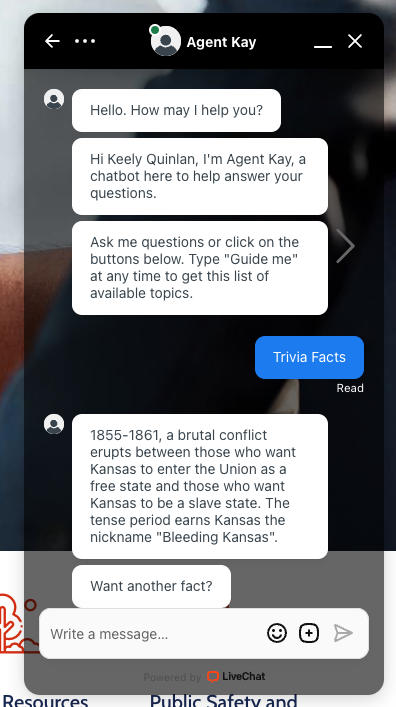
Kansas’ machine learning-powered chatbot, Agent Kay, launched in 2018, complete with trivia questions.
It’s designed to guide visitors through the Kansas.gov Help Center, and it can, reportedly, respond conversationally to more than 200 questions. Unlike some of the other chatbots included in this list, users must first enter a name and email address before selecting a preprogrammed topic, like taxes or state symbols. As with some other chatbots, users can be connected to a live agent if the chatbot can’t answer their questions.
In 2018, Kansas integrated its chatbot with Facebook Messenger, making it one of the first to merge with a social media network.
Atlanta
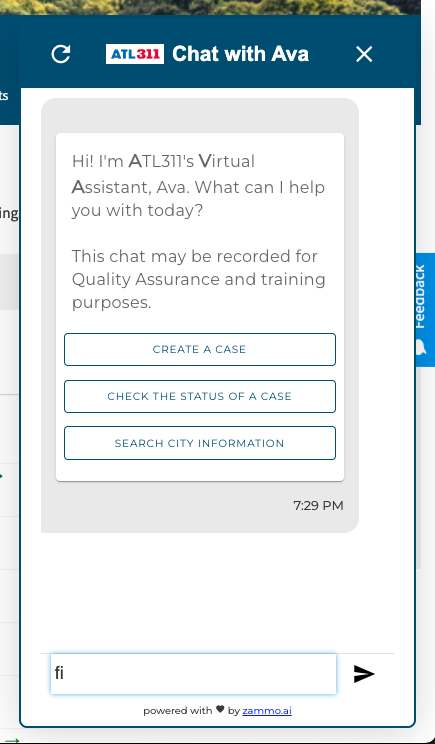
Atlanta’s 311 chatbot — called Ava, or the ATL311 Virtual Assistant — is powered by the AI company Zammo.ai. Users can ask non-emergency questions such as “Where can I pay my water bill?” or “When will my waste be picked up?” The city says they’ll receive responses within minutes. In addition to its web interface, the chatbot is also available via Android or Apple mobile apps.
“With Atlanta quickly becoming one of the nation’s top innovation hubs, City services should be on par with the technology in the private sector,” Atlanta Mayor Andre Dickens said in February 2023 when the chatbot was released. “The enhancements made to our ATL311 network will make it more convenient for residents and the business community to get the answers and support they need. Whether it is reporting a pothole or downed tree, getting traffic or parking information or getting information on supportive services, the new ATL311 chatbot will put the power of information directly in its users’ hands.”

This story was featured in StateScoop Special Report: Artificial Intelligence 2024
